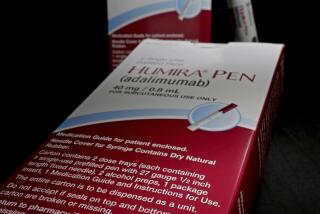Amgen Sued Over Strategy
- Share via
Reigniting a long-running feud, Johnson & Johnson accused Amgen Inc. of using illegal pricing tactics to drive J&J;’s anemia drug from the market.
In an antitrust suit, J&J;’s Ortho Biotech Products unit alleged that the Thousand Oaks-based biotech giant effectively forced cancer clinics to buy Aranesp, an anemia drug that directly competes with J&J;’s Procrit, to get discounts on two other drugs, Neulasta and Neupogen.
The suit was filed Tuesday in U.S. District Court in Trenton, N.J. J&J; is based in New Brunswick, N.J.
J&J; spokesman Mark Wolfe said Amgen was taking advantage of the fact that Neulasta and Neupogen were “unique medications with virtually no competitors” and were regarded by many in the medical community as “life-saving therapies.”
Neulasta and Neupogen increase the number of infection-fighting white blood cells and are given to cancer patients weakened by chemotherapy drugs.
“We believe [Amgen’s] business practice forces physicians to make decisions regarding patient care based on financial incentives and limits patients’ access to Procrit,” Wolfe said.
Amgen spokeswoman Mary Klem said J&J;’s allegations were without merit. “We intend to vigorously defend our position,” she said, declining to elaborate.
The suit is the latest move in an intense rivalry that has played out in the marketplace and in court and that dates to the early days of Amgen.
In 1985, Amgen licensed Procrit to J&J;, and the drug quickly became a multibillion-dollar product. Amgen launched Aranesp in 2001 to reclaim the business it had ceded to J&J.; The drug was introduced after Amgen won a bitter arbitration in which J&J; claimed that Amgen had no right to market Aranesp because the drug was covered by the licensing agreement.
The drugs are mostly used to restore red blood cells in cancer patients suffering from anemia brought on by chemotherapy treatments.
Aranesp has rapidly become Amgen’s most important drug and a key driver of the company’s growth. Amgen reported U.S. Aranesp sales of $983 million during the first half of 2005, up 38% from the same period in 2004. During the first half of 2005, U.S. sales of Procrit -- J&J;’s second-best-selling drug worldwide, after the antipsychotic Risperdal -- were off 11% to $1.13 billion.
Christopher Raymond, an analyst with Robert W. Baird & Co., said he did not expect J&J; to prevail, because volume discounts were not unusual in the drug industry.
“My sense is that J&J;, being a diversified therapeutics company, is as aggressive as anybody when it comes to contracts,” he said.
But J. Alex Grimsley, a partner with Bryan Cave in Phoenix, said J&J; raised “a real antitrust issue.”
“Having a virtual monopoly on a product is not in and of itself wrongful,” he said. “But if you are trying to use your monopoly on one drug to force customers to buy another drug as well, that can be a wrongful use of the monopoly.”
In its suit, J&J; said Amgen’s sales tactics had decimated Procrit’s sales to oncology clinics, a $2.8-billion market. Procrit now accounts for 34% of anemia drug sales in oncology clinics, down from 55% during the first quarter of 2004, the suit says. The shift is entirely a result of Amgen’s tactics, according to J&J.;
Johnson & Johnson claimed that its business was stable in retail drugstores, where Amgen does not offer discounts linked to Neulasta and Neupogen.
Both companies gained in the stock market Thursday: Amgen was up $1.05 to $75.82 and J&J; rose $2.22 to $64.02. For the year to date, Amgen shares have risen 18%, and J&J; is up less than 1%.
More to Read
Inside the business of entertainment
The Wide Shot brings you news, analysis and insights on everything from streaming wars to production — and what it all means for the future.
You may occasionally receive promotional content from the Los Angeles Times.










